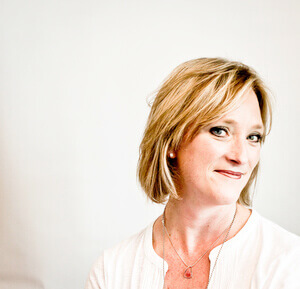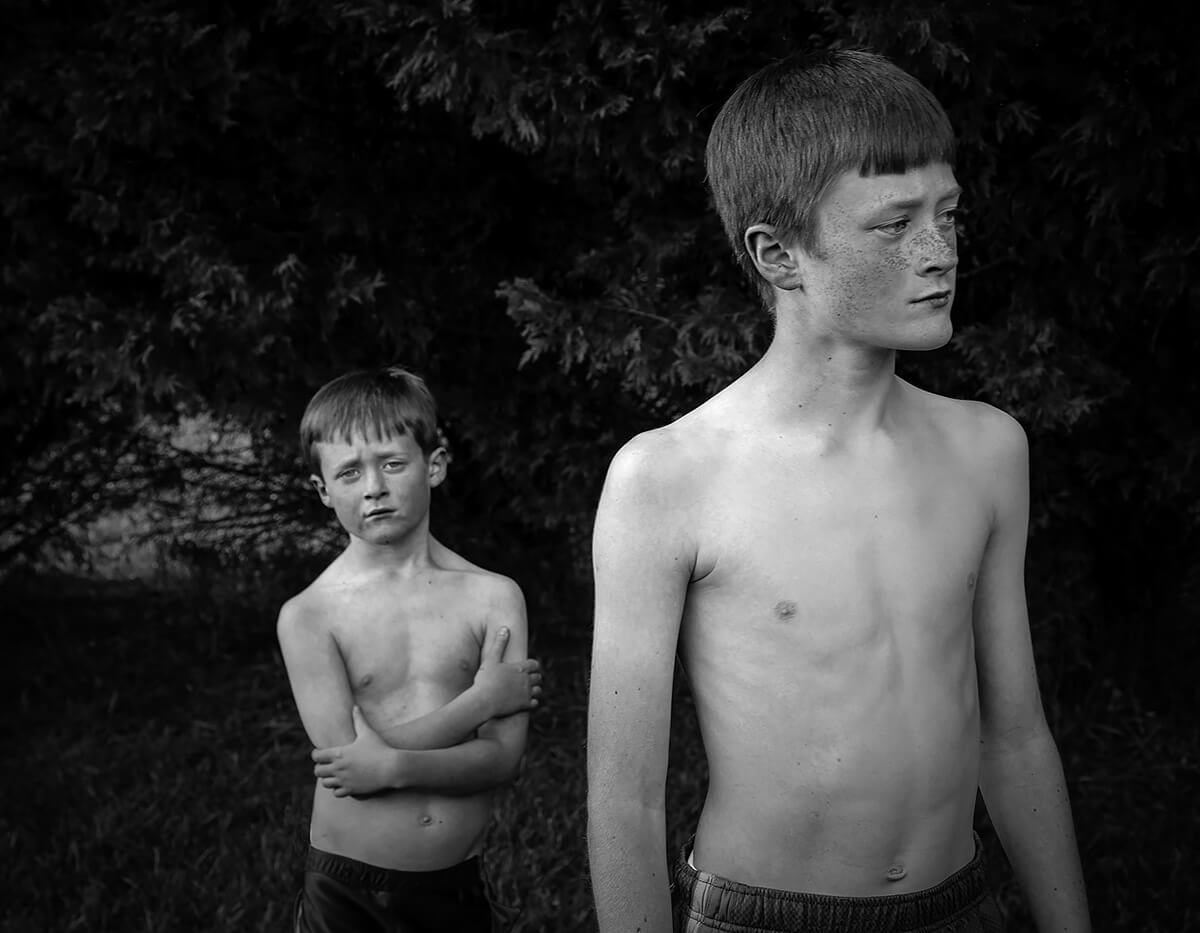Virginia native
Rebecca Moseman received her Bachelor of Fine Arts from Virginia Polytechnic Institute in 1997 and her Master of Fine Arts from Rochester Institute of Technology in 2001. She has worked in academia, private industry, and Government as an instructor, consultant, and graphic designer and does freelance work in photography and publishing. We asked her a few questions about her life and work.
All About Photo: Tell us about your first introduction to photography. What drew you into this world?
Rebecca Moseman: My mother was an amateur photographer so I have many childhood memories of sitting in the darkroom with her as she developed her film. I loved to watch her photographs come into being, and form a life of their own. I felt the darkroom was a strange and magical place where things were brought to life and stories were told by pictures. But it wasn't until years later that I discovered photography for myself after attending a Maine Media workshop one summer. Although I knew very little about photography, I dove right in and spent the week learning about f-stops and apertures, shutter speeds and composition. I'm not sure I understood it all, and certainly couldn't apply it all together to make a successful photograph, but I enjoyed the challenge and was intrigued. One of most significant moments during the week was being shown examples of quality work, and comparing it to what I had photographed. I longed to take photographs like that - photographs that impacted others and people would remember. By the end of the week, I knew something had changed, and I had found my passion.
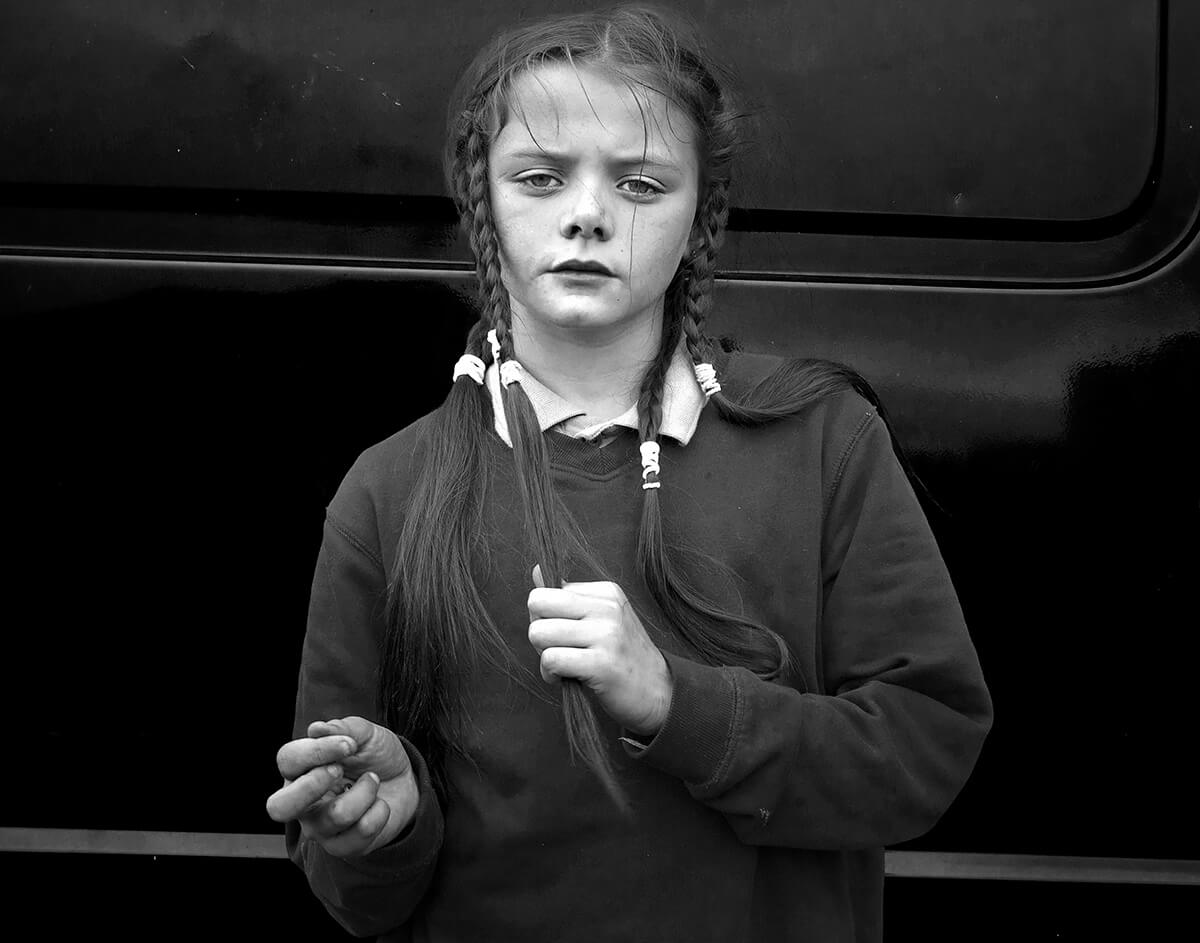
At the beginning of my photography career, my various photography teachers were my primary influences. I was like a sponge trying to soak up all the information and knowledge I could. I went to graduate school to get my MFA in graphic design, so I was well versed in basic design knowledge and art history, but I didn't have any formal education about photography, nor the history of photography, so I looked to my photography teachers to educate me. I studied a lot of different photography work, but I found portrait photography really interested and inspired me.
Photographers I draw inspiration from are Sally Mann,
Mary Ellen Mark,
Dorothea Lang,
Richard Avedon, Diane Arbus,
Walker Evans, Emmit Gowin, and Andrea Modica (to name just a few).
My list is ever expanding. Today I draw inspiration from not only the photographers listed above, but also documentary photographers such as Maggie Steber, Elinor Carucci, Carol Guzy and Eugene Richards. Although their styles and subjects are different than my own I find their storytelling and photographs very moving.
What inspires your unique storytelling?
One of my photography teachers presented a lecture on the history of photography that I found so inspiring. I really enjoyed learning about all the different kinds of photography. It was then that I was first introduced to personal fine art photography, images generated from someplace within, from experience or memory - from longing or sadness. My teacher also introduced me to the work of Sally Mann as an example of not only incredible photography, but to also show me work created from somewhere personal and close to the heart and home. Viewing Sally Mann's photography made me realize I didn't have to travel anywhere exotic or incredible to make beautiful, personal, and impactful photographs. As long as it was honest and personal, and had a message to convey it could work. So, I decided to look around at my life, my boys and started photographing them. I turned my photography from something widespread (photographing everything and anything) to something more focused and personal. At the time I didn't have any real message to convey other than developing my style and steering away from the cute snap shots. I studied a lot of portrait photographers and then tried to use what I saw in their work to reach another level within my own photography. As my children grew and developed their own personalities, I tried to capture those moments or feelings. I tried to find an edge that wasn't always pretty or predictable and pushed the envelope a bit. I tried to document them being boys while capturing their still innocent non-gender dictated roles. What behaviors and gestures were innately masculine, which ones were still ambiguous? It fascinated me, and I photographed them endlessly always looking for those in-between moments that spoke of their souls.
Today, when I make a photograph of someone I want to make them feel as comfortable and relaxed as possible with me so I can hopefully make some kind of bond with them (even for a moment) so that my portrait of them is real and deep. That being said, their display of discomfort does not deter nor disappoint me. I find those conflicting emotions portray an accurate representation of how they are feeling at the moment, and are therefore more genuine, making my photograph of them more interesting.
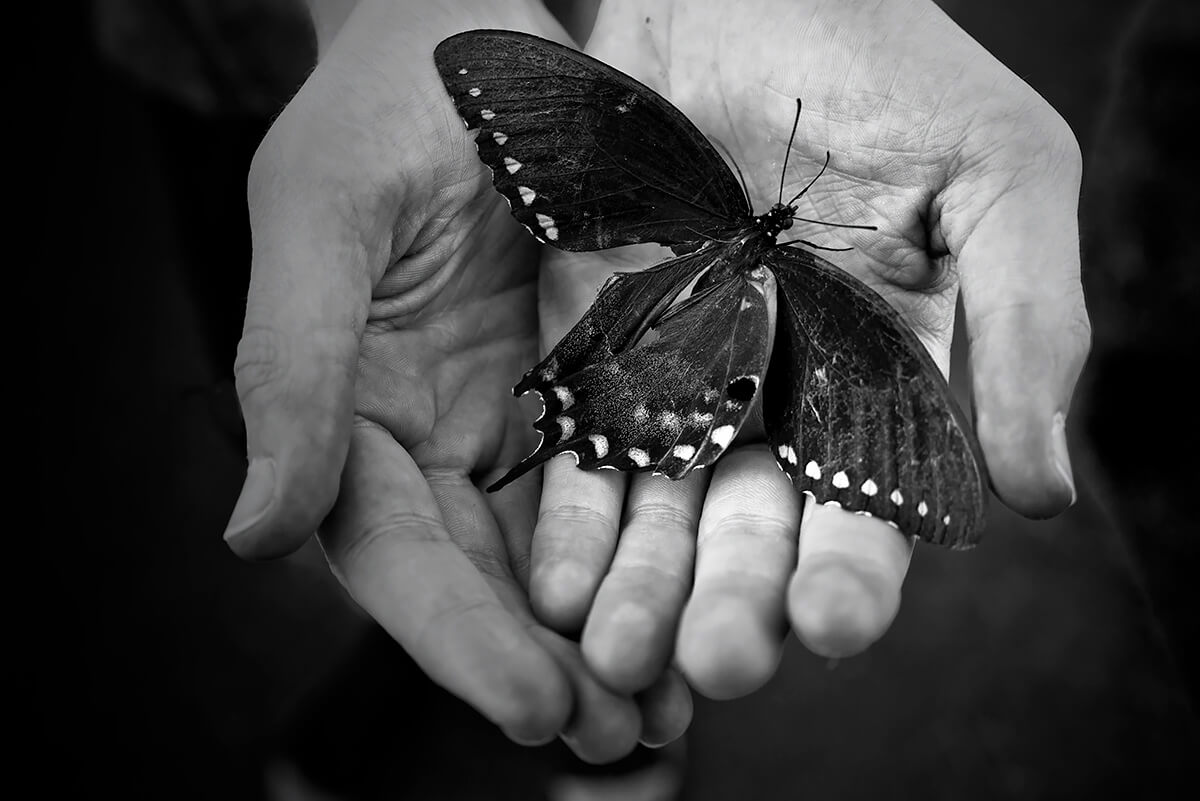
Butterlfy Hand © Rebecca Moseman
Honest, Unique, Human
About your subject on the Irish Travelers, could you tell us why/how you decided to cover that subject?
I consider myself a portrait photographer, and enjoy making photographs of people. I was originally interested in the Travelers because of what I had heard of them, and how they lived. I was fascinated by their culture and traditions. The Travelers have a long history. They are now considered an official insular ethnic group in Ireland (recently officially recognized in 2017 by the Irish Government) and very proud of their traditions, culture and beliefs. For better or for worse they are slowly changing and soon their old way of life will be lost to modern society. My goal in making these photographs is to document them and their way of life as it is now, and to display their unique heritage and unconventional yet historic way of living to a wider audience, in and outside of Ireland. They are mainly invisible to the Irish citizens, and they are desperate to have their stories of hardship heard and their unique culture appreciated and shared around the world.
The Traveler community is suspicious at best when a small group of photographers show up to photograph them. Once they realized that we were there to photograph them because we were interested in who they are, their traditions, and to hopefully bring attention to their needs, they were willing to be photographed. That being said, it was very hard to take any photographs of men. The women, even young ladies, were hesitant to have their photos taken. It took a lot of time to build their trust. The children however were very willing to be photographed. So therefore, although I didn't seek out children in particular to photograph, I found them more willing to let me photograph them. Many of them (especially the young girls) have hopes and dreams of becoming models back in America.
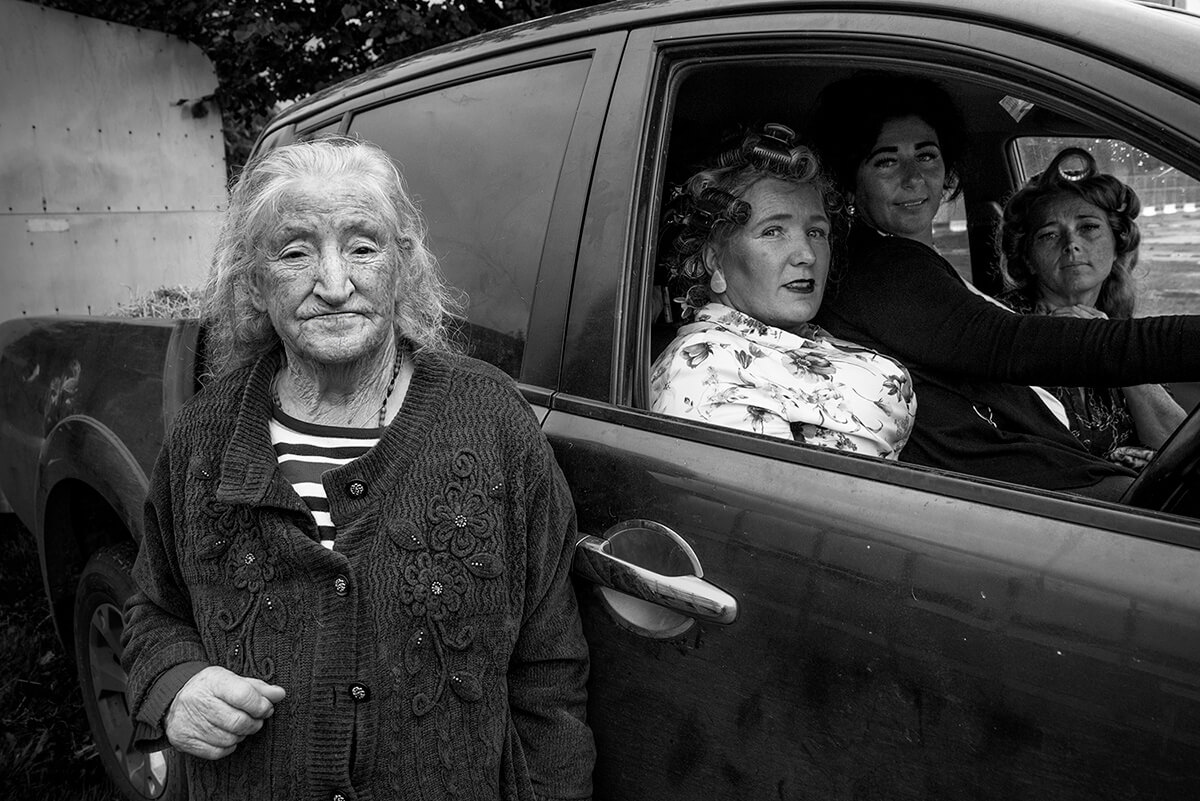
Generations © Rebecca Moseman
Before I return to Ireland to photograph, I assess the photos I have taken from previous trips to discover where I need to fill in the gaps in order to narrate a more successful photographic story. Sometimes this is as simple as visiting new encampments or halting sites to photograph new people, and sometimes it's trying to photograph people of a different age group. There is something magical however in going back to photograph the same people year after year since they can change so dramatically due to their domestic challenges.
My first trip to Ireland was about my reaction to meeting the Travelers and making portraits. My subsequent trips back have been different from my first - it wasn't a new experience anymore and I went with more of an idea of what I wanted to photograph.
My first trip to Ireland I was photographing the experience - everything was new and I didn't have any particular expectations or plan. I just saw and reacted, explored and connected with as many people as I could. I found (in looking back through my photographs of that first time) I didn't take a lot of context photographs - photographs that set the scene to tell a full story. I was so encompassed in taking portraits of the travelers I met, I lost sight of the surroundings they lived in and the details of their lives that made them unique. I discovered later that I was missing those photographs and needed them. They were essential in helping shape and tell the story of who these people are, and how they live.
So the following fall I went back to photograph again and made an effort to flesh out some of the areas I hadn't focused on before. I photographed things that didn't jump out at me as particularly interesting (landscapes, scenery shots, little details) but were necessary to help narrate the story. I was also able to revisit some of the Travelers I had met the previous year and photograph them again. Each time I was fortunate enough to hand them prints of the photographs I had taken of them and enjoyed seeing the joy on their faces. I also understood them better, their plight and circumstances and listened more closely to their stories and struggles. Instead of feeling an awe of seeing them in person for the first time, I not only felt a deeper empathy and connection to them but a better understanding of their stories.
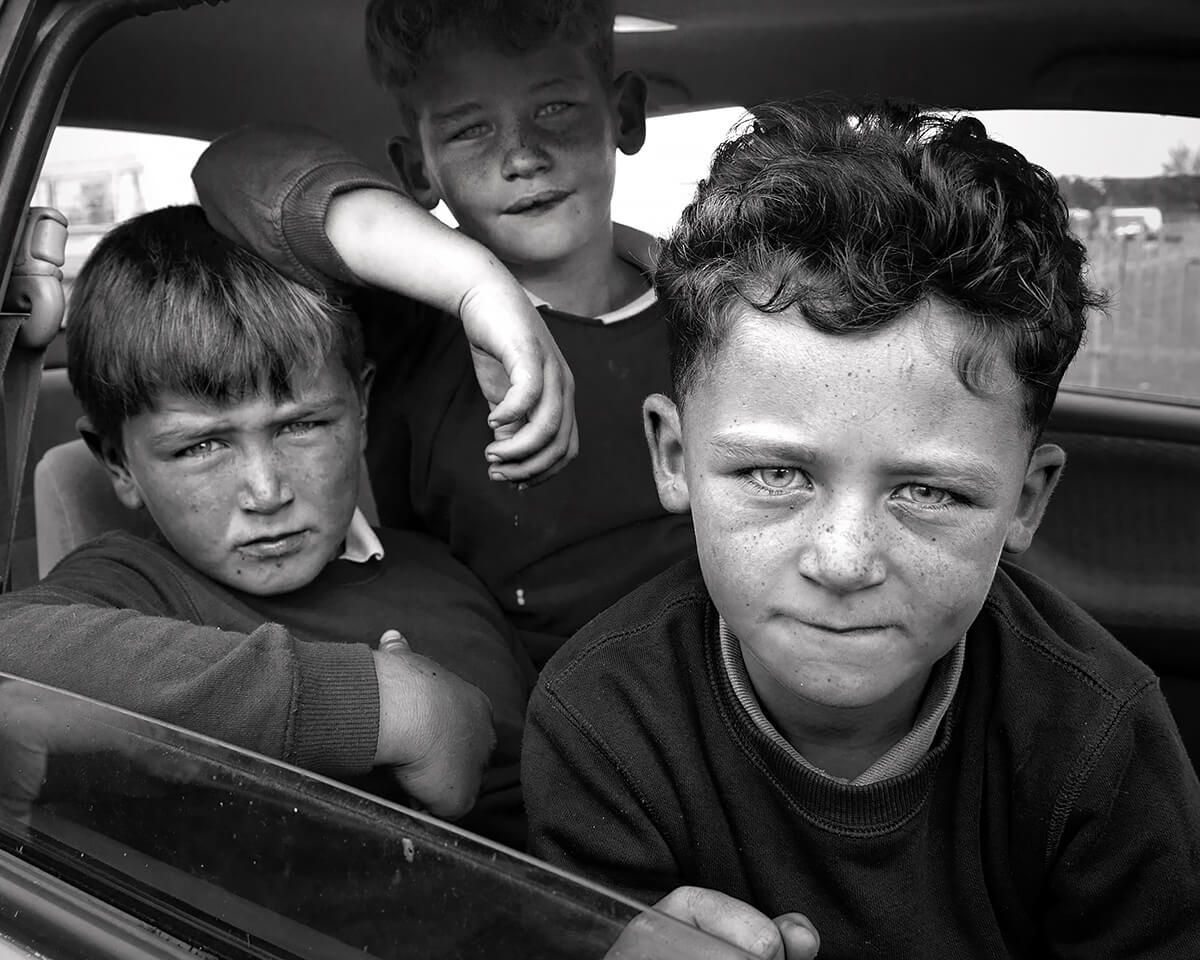
The car boys © Rebecca Moseman
I find people and what makes them tick fascinating. I'm also very empathetic to others (probably to a fault) and always interested in trying to find the core or soul of whomever I'm photographing no matter what outside rough exterior they portray. A person's vulnerability is what I'm essentially after - it's the common ground between us all - on the most basic level. A person's vulnerability and kindness makes them human and real. I aim to find this within my subjects. Perhaps some would say I try to exploit it - but I don't feel I do that. I try to make a connection to my subject, from me to them through my camera, and then show the world that connection.
Even though I try to find that 'connection', I know I ride a fine line between asking my subjects to trust me, and recognizing and using their discomfort. Anytime my subjects allow me to take their photograph, they are surrendering themselves (opening themselves) to me, even if just for a brief moment. Sometimes what they display is anger, aggression, vulnerability, awkwardness, confidence, or lack of confidence. But it's the moment they've agreed (non-verbally) to give me, and these conflicting emotions have led to some of my best portraits.
I also believe patience is important in making a successful photograph. Often times I'm not chasing after any particular image, but I place myself into situations where I'm able to observe others in a non-threatening way, and then look for those magical moments to photograph. The more unplanned and spontaneous the portrait I make the more authentic I feel it is. I do not stage or pre-think my portraits or photographs. Cute, predictable, or posed portraits do not appeal to me.
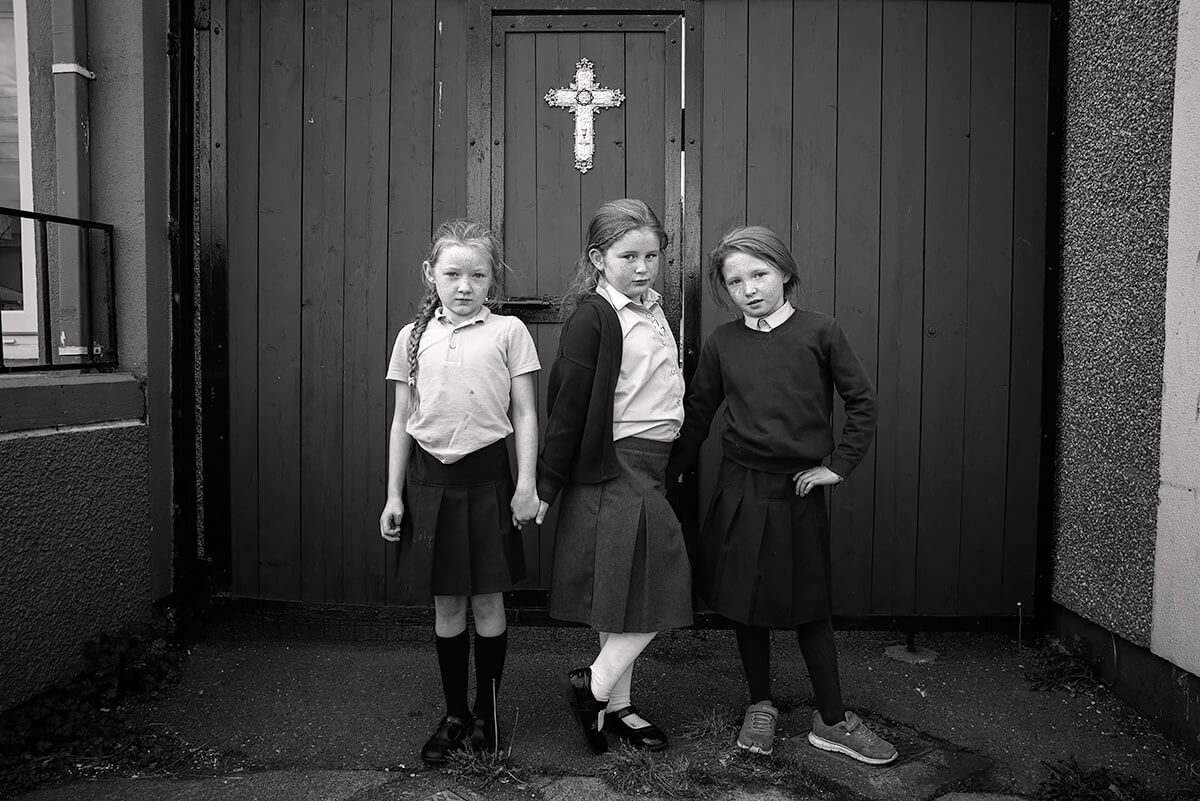
Three girls in front of cross © Rebecca Moseman
I am a mother to three boys (11, 13, 16) and have photographed them quite a bit over the past few years, and specifically focused one of my previous series ‘Into the Moon's Room' on them, their relationship to their aunt who died in 2013, and a story about the Moon. So, I'm familiar with taking pictures of kids - specifically boys, and getting the emotional element out of them that I'm looking for in my portraits.
Is it important to be recognized as a woman photographer?
I think women have a unique perspective they bring to their subjects, and that perspective deserves and needs to be expressed. That being said, I don't feel the need to be recognized as a woman photographer but rather have my work recognized for its quality and impact. I would not necessarily want somebody to view my work as any particular gender expression. I hope my photography work is recognized and appreciated for its connection to the viewer.
Why do you work only in B&W?
When I first started taking photographs, all my work was in color. But, as I honed in on my interest in portrait photography I found I could reach a more rich, intimate level for myself and ultimately for the viewer by photographing in black and white. For me, the color of the portrait photograph distracts me from the raw emotion of the subject.
What equipment do you use?
I've been a loyal Nikon fan with a few exceptions. For most of my work I've used a Nikon D610 and I recently purchased the Nikon Mirrorless Z7 which I'm excited to start using. I also use an Olympus Mirrorless OMD II.
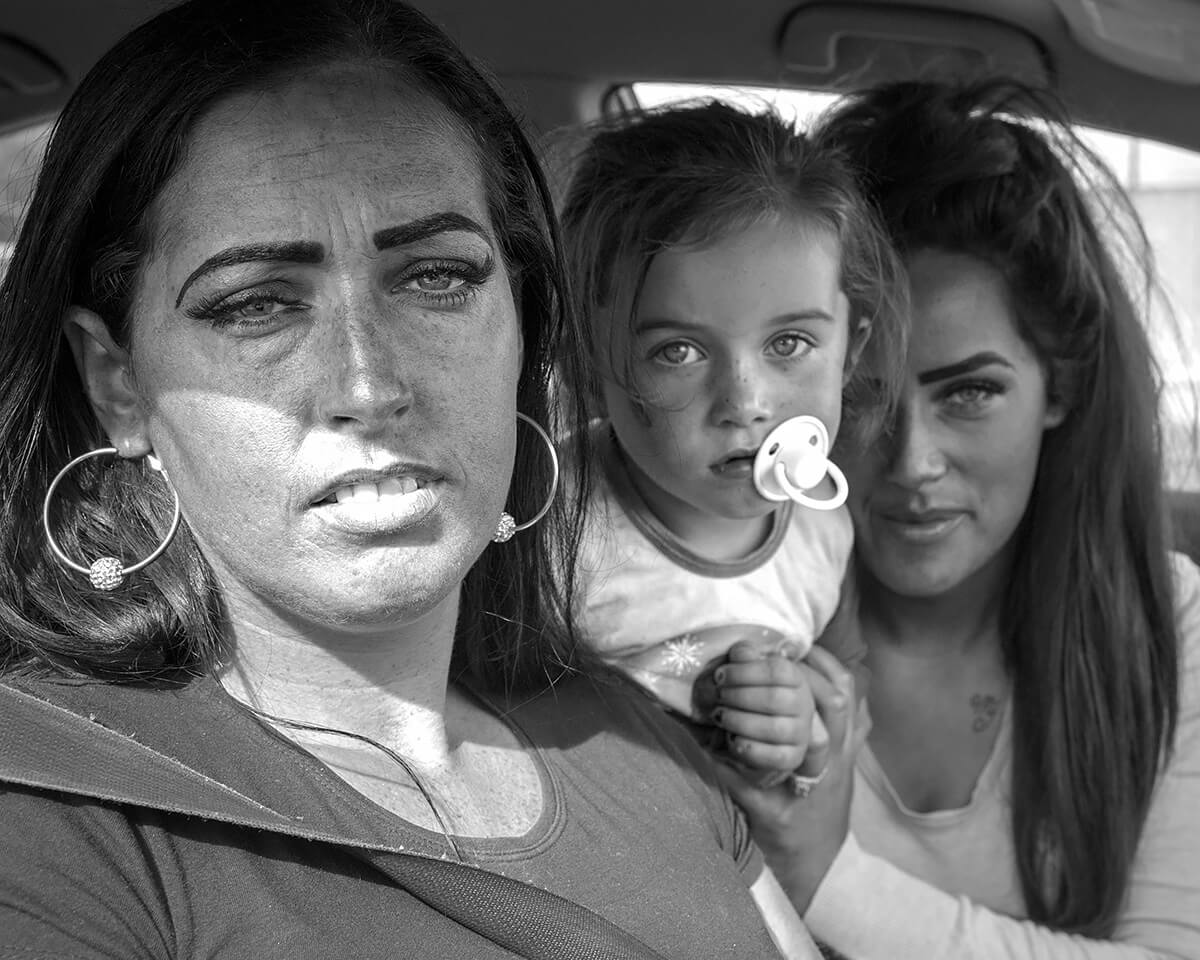
Young Traveler Mothers © Rebecca Moseman
I usually spend time going through my initial captures from the day, and do a loose edit to my work. I do not remove or delete any of my photographs however until I've had a chance to do another edit, preferable a few weeks later. I've discovered that I do my best editing after time has passed and I don't have the memory of the moment in which I took the photograph fresh in my mind. The memory can sometimes cause a reaction or bond with the work that could deter me from seeing it with an objective perspective.
What advice would you give someone who would like to become a photographer today?
I would tell somebody who has an interest in becoming a photographer to be patient and work hard. It takes time to develop your particular style and your niche. Sometimes the harder you push yourself to establish your style, the more forced it looks. Your style will start to portray itself naturally in time, and will be more genuine and honest.
I would also tell somebody to participate and take advantage of as many critiques as possible not only of their work but of others and to really listen to what is being said. I learned so much from listening to my teachers critiques of not only my work but also the work of my peers. But it's also important to recognize that one opinion is just that,
one opinion. Even if your work doesn't appeal to the viewer doesn't mean you should give it up or that it's bad photography. If you really believe in it, keep pursuing it. Chances are it will eventually develop into something beautiful.
I would also advise someone who wants to pursue photography (especially fine art photography) to have a plan B, or at least have some practical business knowledge or other skill set you can fall back on if and when you may need to. Establishing a name for yourself and getting work noticed and out in the art world can take a lot of time and patience - relying on the sale of your work to sustain you financially can be tricky. Perhaps consider getting qualified to teach, or explore another skill set that interests you so that you can have something to fall back on when things get hard.
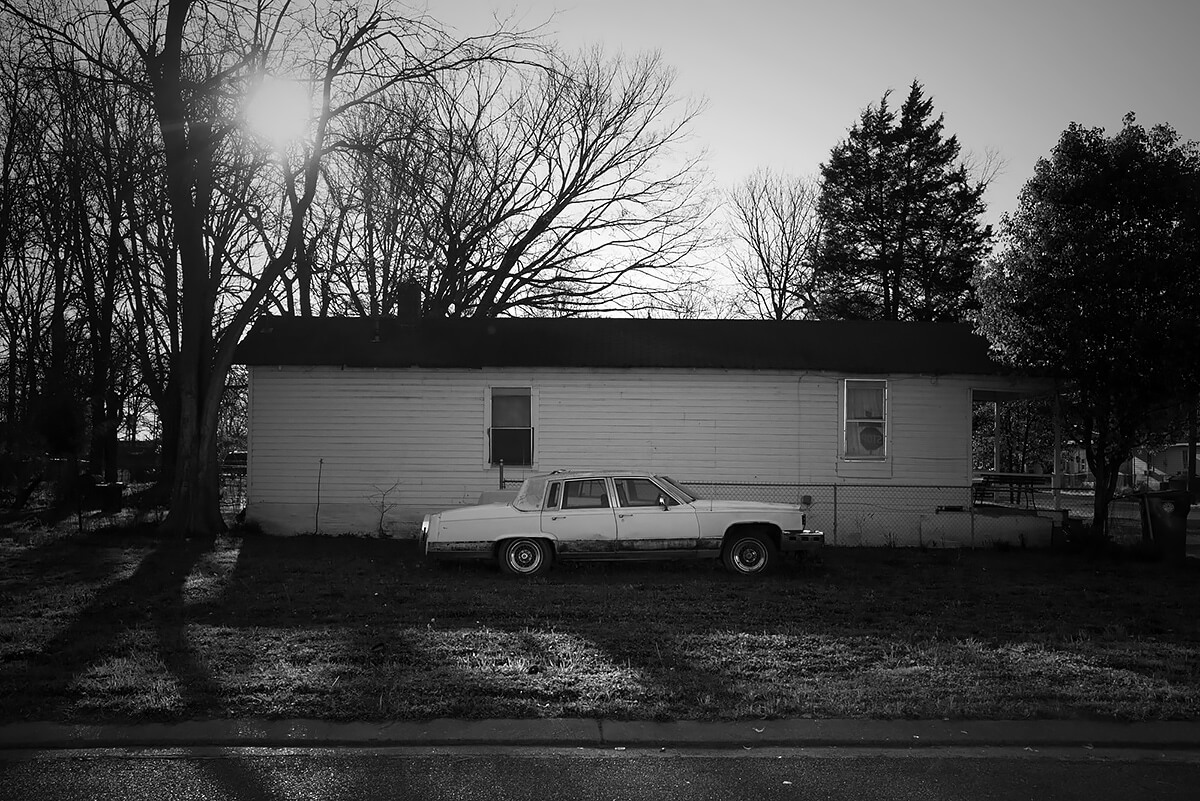
Baptist Town Trailer © Rebecca Moseman
Not having a Plan B.
Avoid having too large an ego, and don't be afraid to fail. Remember you will continue to grow and learn from other people and different situations.
Your best memory as a photographer?
One of my fondest memories as a photographer is giving prints back to the wonderful people I've photographed. Their joy and gratitude is always a great moment for me.
If you weren't a Photographer, what would you be doing?
My full time job is as a graphic designer, so if I'm not photographing I'm designing!
Anything else you would like to share?
I feel incredibly grateful that I took a chance that one summer on a workshop that pushed me out of my comfort zone. If I had been afraid to take a leap into the unknown I would never have discovered my passion, met so many interesting people and friends, nor had the opportunity to travel to different places to photograph such unique people and places. Photography has enriched my life in so many wonderful ways.
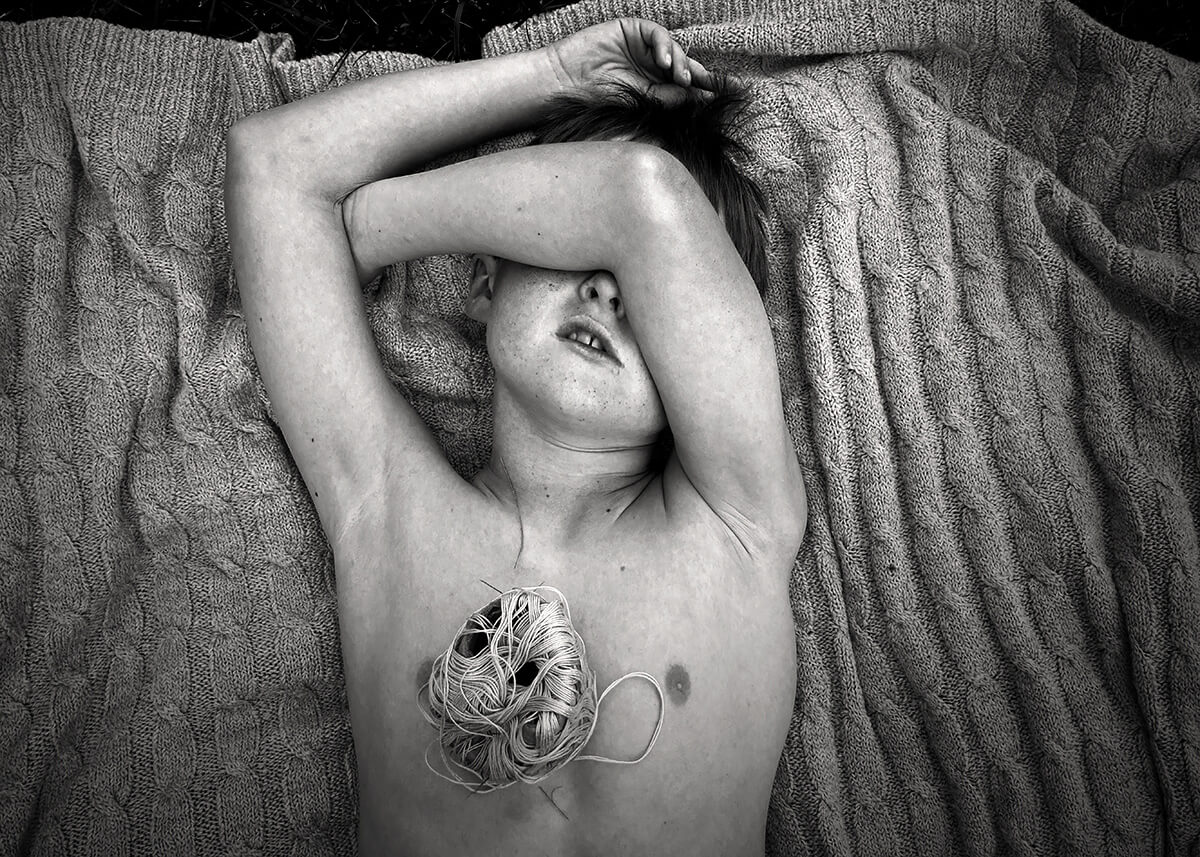
Alex's blanket © Rebecca Moseman
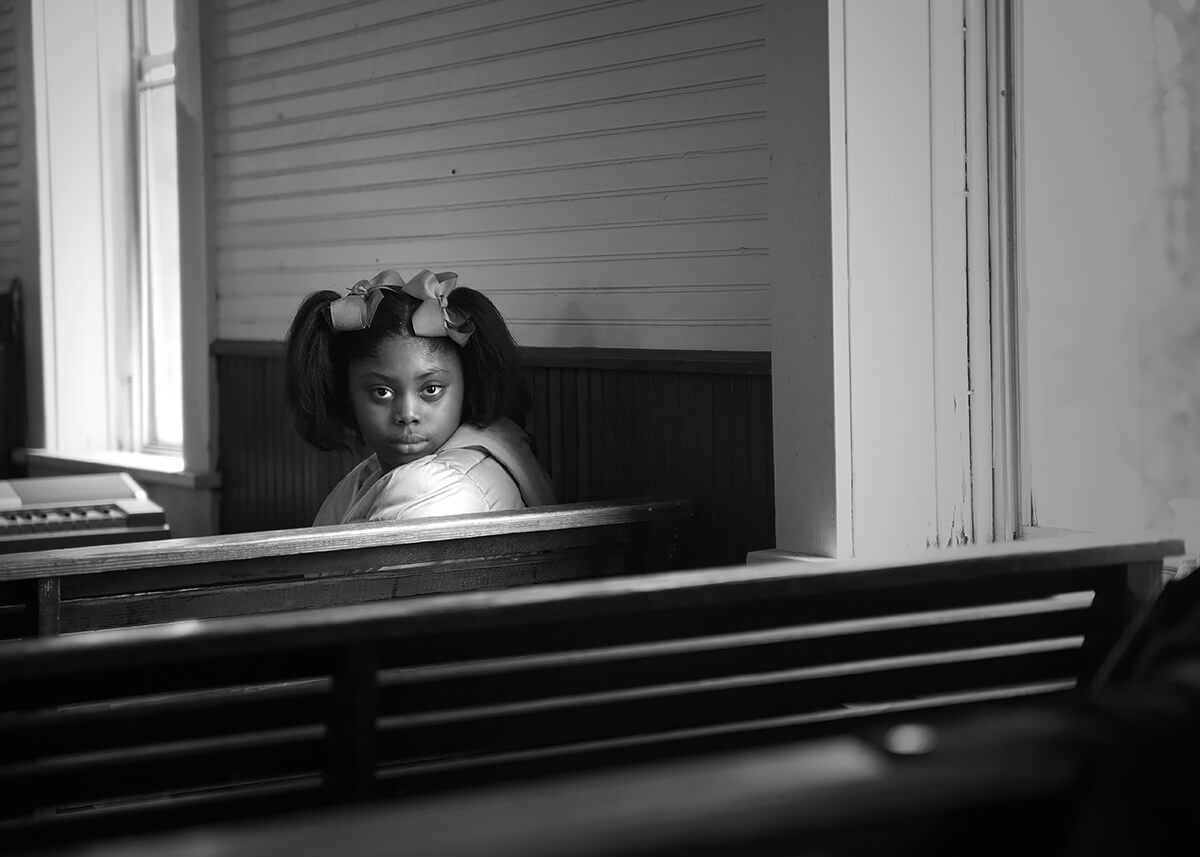
Church girl © Rebecca Moseman
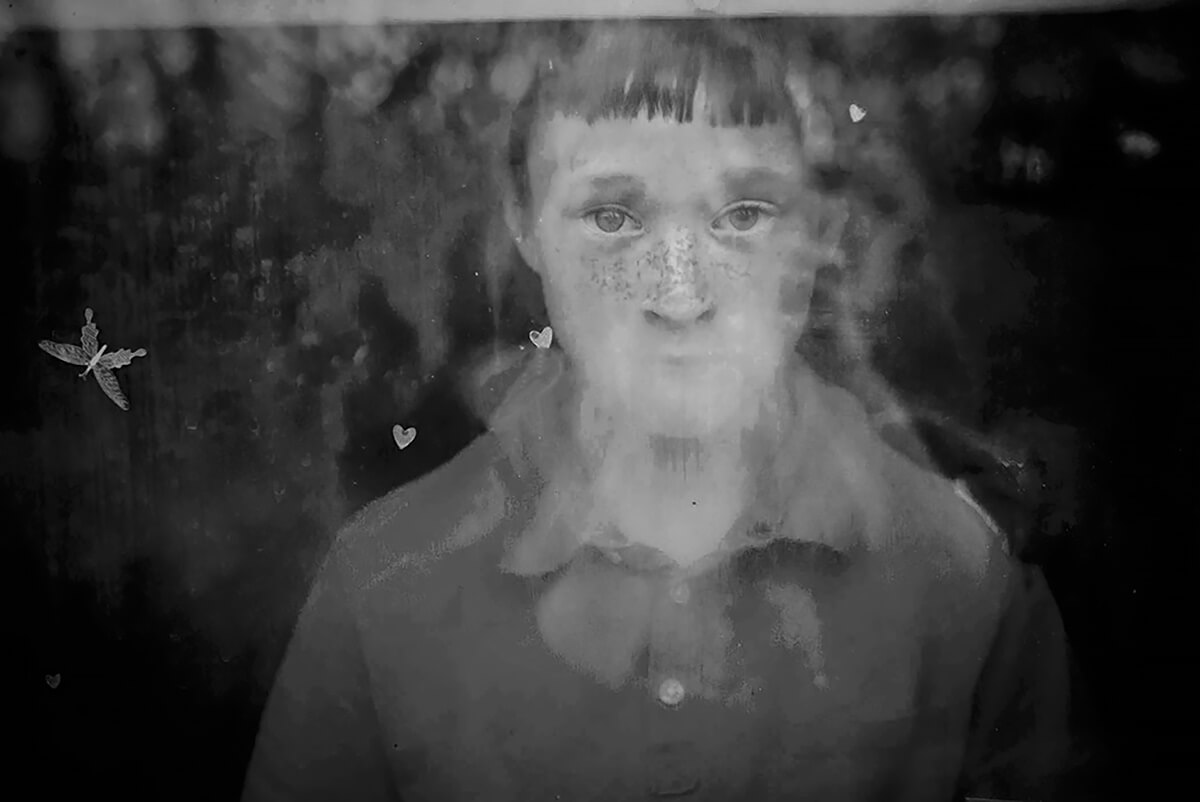
Fading from memory © Rebecca Moseman
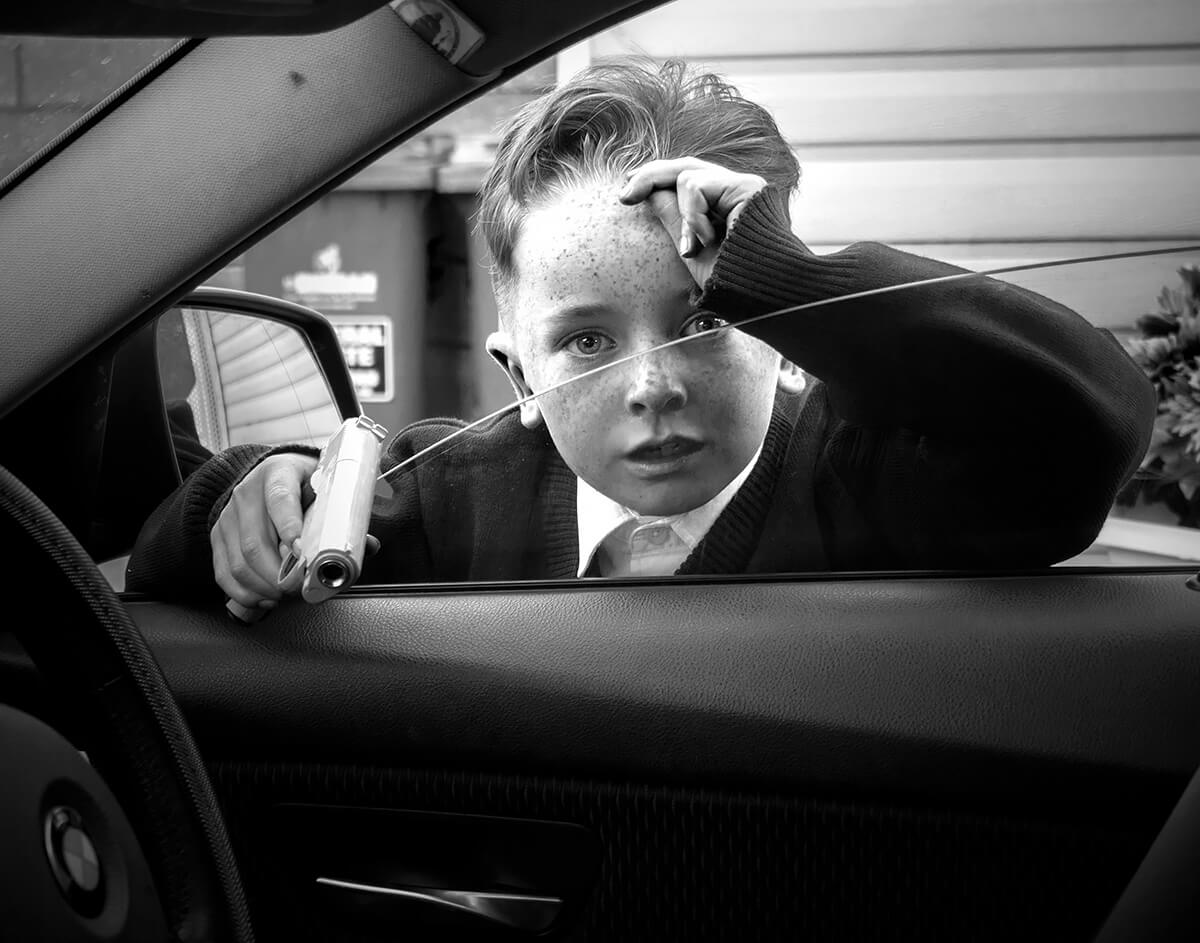
Jonathan with gun © Rebecca Moseman
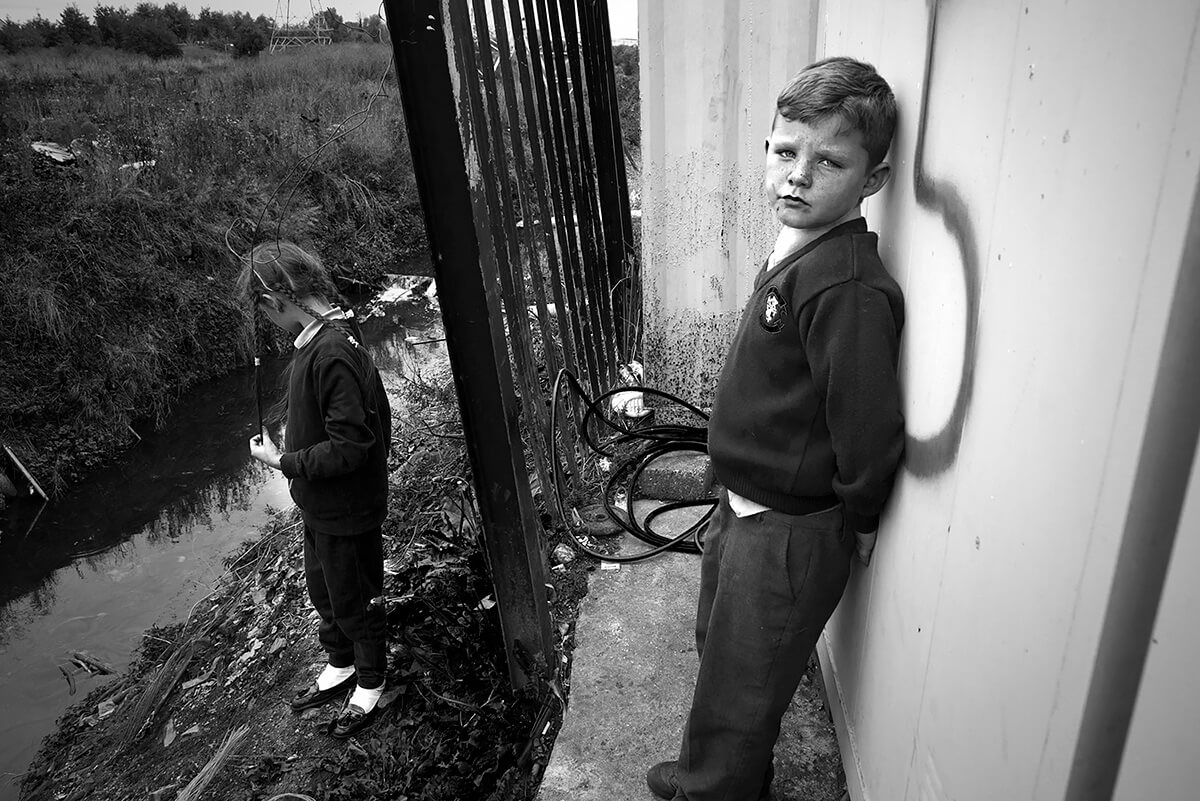
Number 5 by river © Rebecca Moseman
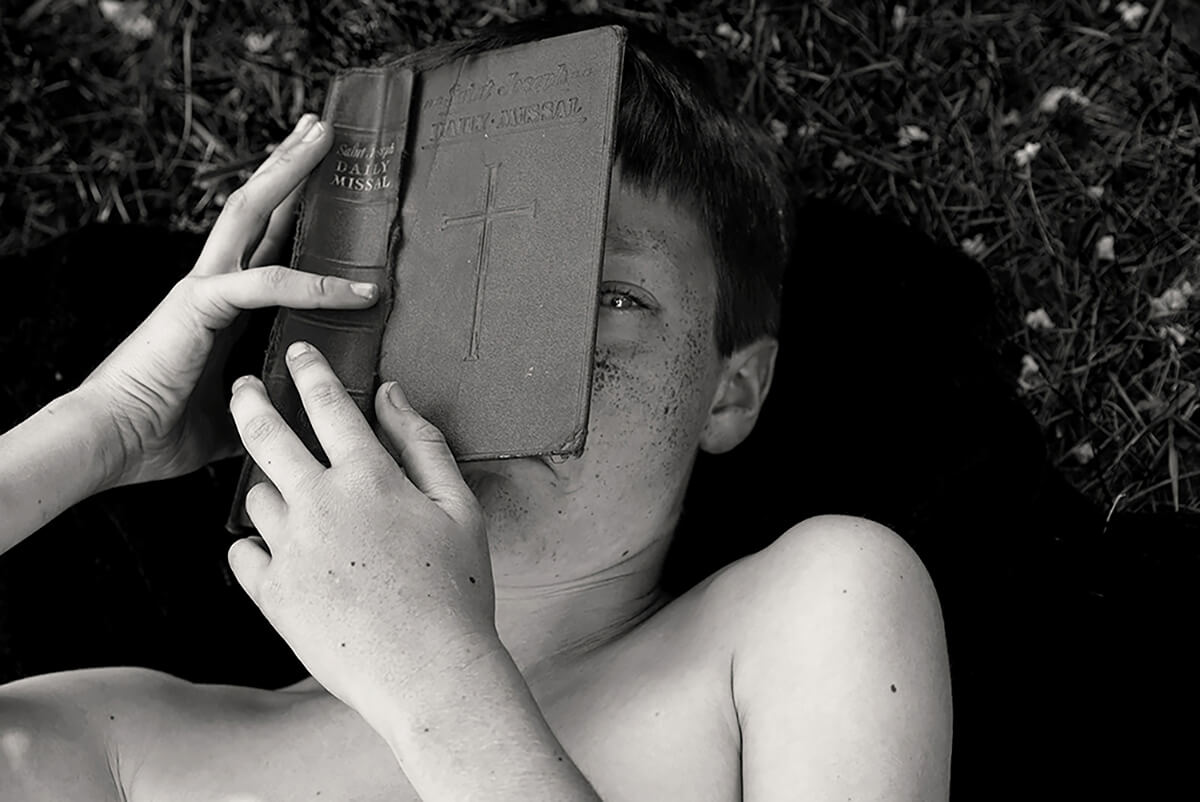
The book © Rebecca Moseman
